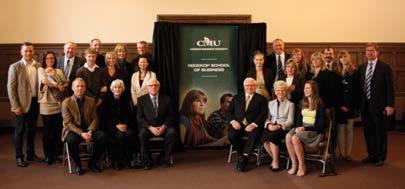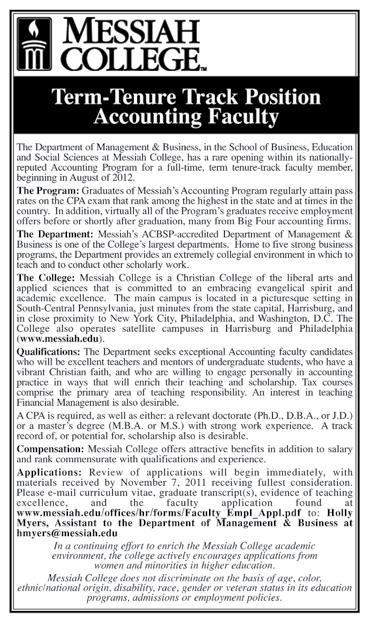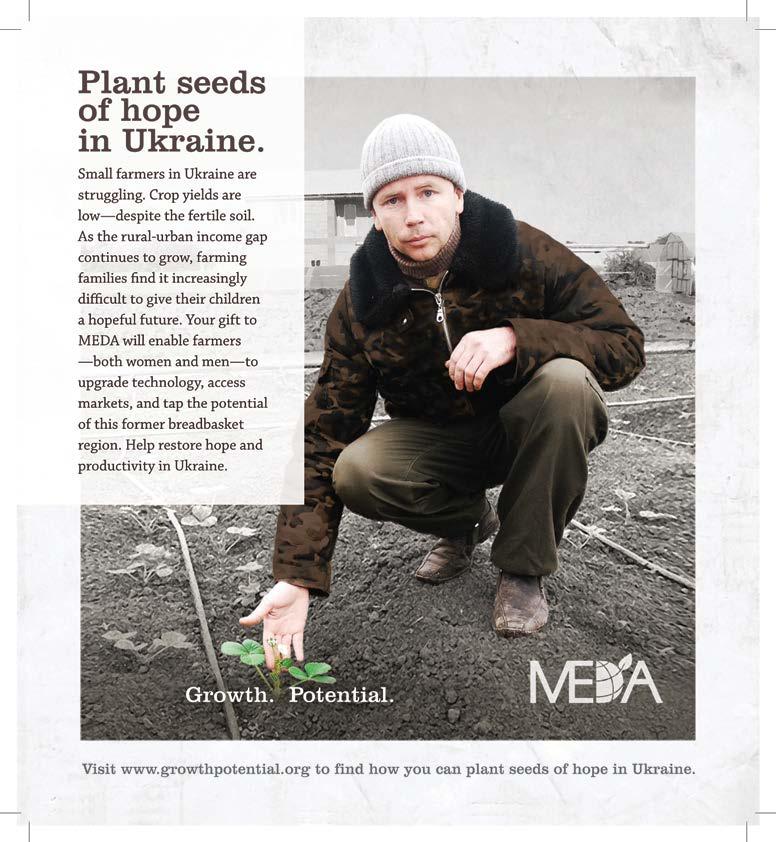
6 minute read
News
$6.5 million gift launches business school at CMU
The Redekop School of Business was launched Oct. 19 at Winnipeg’s Canadian Mennonite University (CMU), financed by a prominent family of West Coast entrepreneurs.
The school was established “as an expression of thanksgiving for God’s providential care for the family of Jacob and Maria Redekop, and their children Mary, Jacob, John and Peter,” said CMU president Gerald Gerbrandt.
The two brothers, John and Peter, their nephew James, and the extended family, have together pledged a minimum of $6.5 million and potentially up to $7.5 million to found the school. Twenty-four members of the family travelled to Winnipeg from Alberta and British Columbia for the announcement.
The late Jacob and Maria Redekop, together with their four children, fled to Canada from the Soviet Union following World War 2. They spent four months in Manitoba, where they were welcomed by family and church, before settling in British Columbia.
“We see the need to educate the next generation in commerce, marketing and finance, and to do this in a university that inspires and prepares future leaders with skills complimented by Christian ethics, integrity and service,” said Peter Redekop on behalf of the Redekop family.
“The school will greatly enhance the university’s ability to prepare and educate a significant number of Christian business leaders who will provide a positive influence on society and the life of the church, and who will have the resources to fund the church’s institutions,” he said.
CMU’s business program will use an inter-disciplinary approach in preparation for a global business environment. The goal is to prepare students to become engaged in business and not-for-profit organizations, with a worldview and character shaped within a Christian university community.
Redekop School of Business will offer career opportunities for students through the following programs: • a Bachelor of Business Administration degree (4-year, with a 5-year Co-op option) with majors in Business Management, Not-for-Profit Management, Accounting, and
Twenty-four family members traveled to Winnipeg for the launch of the new Redekop School of Business.
Human Resources Management; and • a Bachelor of Arts degree (3- and 4-year), major in Business and Organizational Administration. The school will offer opportunities for a term of study in an international setting, and interaction with business and not-for-profit leaders. “We are convinced that the Redekop School of Business will have a positive impact on our church, our community and all those who will be served by our business graduates,” said Gerbrandt. (CMU release)
Web & e-mails not benign when it comes to energy
Many people think sending an e-mail doesn’t consume much energy as long as you don’t print off the message. Not so, according to those who monitor the growing environmental impact of our wired world. They say the power needed to send text messages and keep mobile gizmos roaming and on alert is growing by leaps and bounds with 1.5 billion people using the internet every day.
A European environmental assessment agency has studied the impact in Europe and found that such technologies already contribute two percent to greenhouse gas emissions and will double by 2020.
The French have taken the report seriously and have examined the carbon footprint of their use of e-mail, web searches and document transmission. E-mail volume is already huge, and growing. In 2009 daily worldwide volume of e-mail was estimated at 250 billion. That number is expected to double by the end of next year.
The French study found that someone working for a company that employs 100 people is likely to receive an average of 58 e-mails a day and will send another 33. Based on that volume, professional e-mails can produce 300 pounds of greenhouse gas per employee per year. The carbon impact comes from the energy needed by the computers to store, process and send data, as well as the energy that goes into making the components in the first place (flashdrives reportedly are high energy offenders).
Web browsing also takes a toll, as servers use electricity, generate heat and need to be kept cool. An average web browser using a search engine to gather information produces up to 22 pounds of greenhouse gas per year.
Among the gas-calming suggestions: send e-mails to fewer recipients and reduce storage of messages and attachments on a server. And, of course, print only when necessary. (Guardian Weekly)
Send a girl to school, boost the economy
“Gender equality is smart economics,” says a new World Bank report that finds a strong positive correlation between equality and per capita gross domestic product.
Countries that create opportunities for women and girls gain the benefit of stronger productivity and strengthen development prospects for everyone, says the report, released this fall.
That’s no surprise to people who work in development. They’ve known that women dominate the frontlines of poverty, that more than twothirds of the world’s poor are women, and that girls are twice as likely as boys to suffer from malnutrition and childhood diseases. They also know that assistance to women goes farther than the same assistance provided to men. Income in the hands of women contributes more to household food security and child nutrition than income controlled by men.
The World Bank report says output per worker in low income countries would jump 25 percent if barriers were removed that hamper women from working in certain occupations or sectors. Giving them the same access as men to education and economic opportunity would boost productivity and economic efficiency across the board.
In Ghana, for example, the study found that giving female farmers equal access and treatment would boost maize yields by 17 percent; in Malawi by 11 to 16 percent.
In Burkina Faso, agricultural production generally would grow by six percent if women’s
Impact study shows gains for Afghan women farmers
Final impact figures have been compiled for MEDA’s Through The Garden Gate project in Afghanistan. The four-year project, which concluded this summer, helped 2,349 women in isolated villages to develop backyard gardens and boost family income.
The project employed a “lead farmer” strategy, selecting local women with entrepreneurial zest and ability and equipping them to serve as group leaders to train other women.
As a result of the project, farmers increased their annual income from $38 at the start (2007) to $323 by completion this summer.
Lead farmers, who planted larger plots and more diverse demo crops, increased their annual income from $101 in 2007 to $866 in 2011.
All farmers also reported significant increases in assets and community status. More children attended school, household nutrition improved, and families reported better access to medical care.
A complete final impact study appears in the fall 2011 issue of MEDA’s new So What? publication. It can be seen online by going to www.meda. org and following the media links. ◆ property rights were improved and if inputs such as fertilizer were reallocated from men to women.
While inequality and earnings gaps persist, positive strides have been made, the report says. Female literacy has improved. Countries like Bangladesh and Colombia have narrowed the gender gap with higher school enrolment, lower fertility rates and stronger labor market participation.
“Blocking women and girls from getting the skills and earnings to succeed in a globalized world is not only wrong, but also economically harmful,” says Justin Yifu Lin, the World Bank’s chief economist. “Sharing the fruits of growth and globalization equally between men and women is essential to meeting key development goals.” ◆





